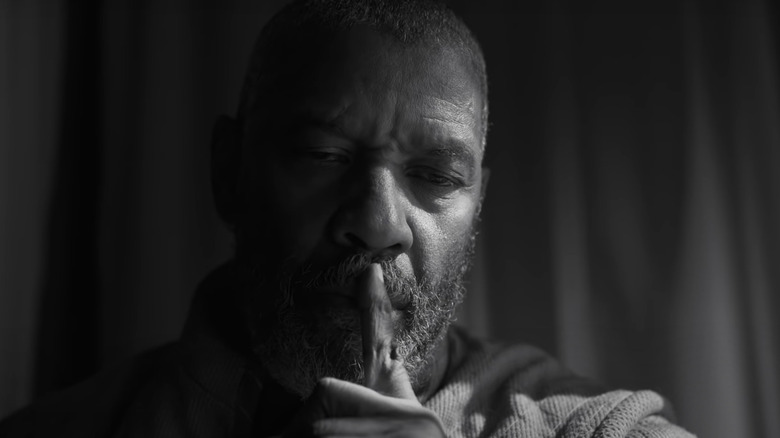Trippingly On The Tongue: Denzel Washington, Leonardo DiCaprio, And Why Americanized Shakespeare Works
Though not especially common, we've seen it done before: an unassuming man steps up to the spotlight of a celluloid Shakespeare adaptation and, instead of the heightened English affectation we've come to expect, we're greeted with an American dialect that isn't fussy and gets straight to the point. There's something really intriguing about it, and the fact that it isn't a regular occurrence makes it all the more melodic to the ears. Denzel Washington's turn as Macbeth in Joel Coen's "The Tragedy of Macbeth" brings exactly that sort of attraction to the role by using his normal dialect, a welcomed addition to the actor's already-impeccable portrayal of the power-sick wannabe king. In fact, one of the best parts of the iconic actor's performance is the way the dialogue flows from him, how he makes it his own and shapes it wholly of his mouth — almost as if it has never before been said any other way.
We know that's not true, of course, but it's one thing to hear an Englishman, or a Scot, or an Irishman, do Shakespeare; it's an entirely different experience to hear an American man take up the same roles. Like Washington's nuanced and rich performance in "Macbeth," the text becomes more compelling, and, in turn, more relatable when Shakespeare adaptation films don't rely on, or require, U.K. accents to pay respect or homage to the history of the text.
Why Americanized Shakespeare Works
Like I said, it isn't every day that we get this particular brand of idyllic American Shakespearian hero — but we do have at least one excellent example of yore whom Washington, funnily enough, seems to be picking up the torch from. Leonardo DiCaprio's similarly unique turn as Romeo in Baz Luhrmann's "Romeo + Juliet" stunned audiences in 1996, but not just because Leo was extremely fine at age 22 when the film was released. It was also the young actor's penchant for making the at-times complicated dialogue palatable with his pedestrian dialect, a voice that makes him sound like just any guy, not one of the world's most desirable movie stars.
Romeo's first monologue sets the scene for exactly what you're going to get with DiCaprio's version of the character. "Why, then, O brawling love, O loving hate! O anything of nothing first create. Heavy lightness, serious vanity. Misshapen chaos of well-seeming forms," he says in a voiceover as he writes the poetic lines in his leather-bound journal. With his look and his intellect, Romeo's voice is the icing on the cake of his introduction to the audience; He's clearly gorgeous and smart, but innately relatable, like he could've grown up in the house next door. Of course, Luhrmann made a directorial choice to set his adaptation of the text in Verona, California, but not everyone in the cast used an American accent in the film. Overall, DiCaprio's dialect stands out the most throughout the movie, because it shapes the text in a way that makes the dialogue easy to follow for everyone. He brought a sense of assurance to the text that typically feels common only with trained Shakespearian actors using heavy accents, as the writer's work has been most typically performed over the years.
Washington's introduction in "The Tragedy of Macbeth" functions similarly to DiCaprio's opening; His presence and sheer handsomeness proceeds him and the character, but his American accent implores you to look at the future king in a different way. "Stay, you imperfect speakers. Tell me more. By Sinel's death I know I am Thane of Glamis. But how of Cawdor? The Thane of Cawdor lives a prosperous gentleman, and to be king stands not within the prospect of belief," he says to the Weird Sisters, begging for more information after they give him a prophecy that he will soon become king. There is a softness, an everyman quality about Washington's Macbeth that comes directly from his American dialect. Sure, at this point in the film, he has yet to achieve the power of his future self — or be corrupted by it — but his unaffected accent hammers home his station, and somehow makes him all the more menacing once he has become tyrannical.
All in all, the usage of American accents removes the self-imposed airs of received pronunciation, a specific and almost light version of an English accent also known simply as received pronunciation, or RP. "A dog of the house of Capulet moves me!" one of the Montague errand boys screams the opening line of "Romeo + Juliet" from a racing convertible, his wacky exclamation setting the tone for a raucous version of the text we'd never seen before. On the same note, Frances McDormand's Lady Macbeth gives her "Screw your courage to the sticking place" monologue with a frankness that punctuates her muted midwestern cadence. It isn't just our leading men that make this effective; any performer can make it work — and they do.
Don't Forget Shakespeare's Original Pronunciation
The original Elizabethan pronunciation of the Bard's works has been unearthed by linguists over the years — and, surprisingly, it doesn't sound anything like the classic RP, a standard English accent, or your average American. Elizabethan English sounded way closer to an Irish lilt than anything else, and it's pretty cool to hear the original text in such a specific dialect. Many a recording exists online, and it is certainly different from what you expect when you sit down to watch a Shakespeare performance.
While we have yet to see a Shakespearian film adaptation in original pronunciation (aka original pronunciation, or OP), it definitely wouldn't have the same effect as using an American accent. The original pronunciation is pedestrian in its own right, but it very much sounds like a product of its time. No, the best way to get to the heart of the Bard's iconic lines is to strip them down to their bare bones and put them between the lips of men like DiCaprio and Washington, who build them inside of themselves and deliver them with clarity and bare naked passion. Original pronunciation reflects the nature of the world surrounding Shakespeare's tales when they were written, as received pronunciation represents their evolution as sacred over time. Allowing these words to be spoken with an American accent highlights how they have been molded and shaped by language and how we find identity in our speech. Needless to say, there is an access that comes with the casualness of Americanized Shakespeare that opens up the text for a whole host of those who might've stayed away — but even deeper, through the dialect, the text becomes what it always was: the reflection of the common man.


